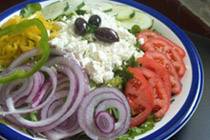 |
My Big Healthy
Greek Diet
As proudly explained by Gus, father of the bride in the hit
movie My Big Fat Greek Wedding, Greece has given the world
many gifts, from architecture to philosophy. Certainly one of
Greece's most valuable contributions is its cuisine.
|
At the core of the traditional Greek diet are dark-green leafy
vegetables (often wild-gathered), including dandelions,
spinach, mustard, fennel, cumin and purslane; fresh fruits
such as figs, pears, plums, grapes, melons and oranges;
high-fiber whole grains, beans and lentils; complex
carbohydrate-rich pastas and breads; olive oil; nuts; and such
herbs and spices as garlic, oregano, bay leaves, cinnamon and
cloves.
Rich in immune-boosting antioxidants, the Greek diet provides
cancer-fighting compounds, healthful omega-3 fatty acids and
colon-cleansing fiber, which all help lower the risks of diet
linked diseases, including heart disease, obesity and
diabetes. A 2003 study conducted jointly by researchers at the
University of Athens in Greece and Harvard University found
that people who consumed a traditional Greek diet experienced
a 33 percent lower risk of death from heart disease and a 24
percent lower risk of death from cancer.
Many Greek dishes contain cheeses, such as feta made from
goat's or sheep's milk. These cheeses are lower in fat and
easier to digest than those from cow's milk. Greeks enjoy
thick, creamy goat-milk yogurt with fresh fruit and a drizzle
of honey.
Greek cuisine is noted for its lamb dishes, but lamb is
traditionally only eaten on special occasions. More often,
Greek meals include fish (anchovies, cod, flounder and tuna,
for example) in moderate portions throughout the week. As
shown in several studies, the omega-3 fatty acids in fish oils
help prevent heart attacks and high blood pressure.
The ancient Greeks regarded olive oil as a gift from the
gods—olive trees were valued as much as gold. Modern nutrition
also places high value on olive oil, finding that it offers
numerous health benefits. The traditional rural Greek diet
features olive oil as the principal fat, rather than butter
and margarine. Olive oil is high in monounsaturated fat, and a
1989 study revealed that it raises levels of HDL ("good")
cholesterol while lowering artery-clogging LDL ("bad")
cholesterol.
Numerous studies, including one published by the American
Heart Association, have shown that people who eat a high
monounsaturated fat diet, such as the traditional Greek diet,
have a lower risk of heart disease than people who eat more
saturated fats, which include butter and margarine.
Researchers also found that people who consume olive oil have
a lower risk for other diseases, too. Studies conducted by Dr.
Dimitrios Trichopoulos at the Harvard School of Public Health
indicate a link between olive oil consumption and a lower
incidence of breast cancer and osteoporosis.
And a 1999 study conducted by Dr. Athena Linos and colleagues
at the University of Athens Medical School showed that the
Mediterranean diet may even help protect against rheumatoid
arthritis. People who consumed olive oil and lots of cooked
vegetables had a 39 percent lower risk of developing this
joint disease.
Greek food may taste delicious, but the secret behind the
healthy Mediterranean diet lies not in consuming more Kalamata
olives and fish, but in adopting the entire Greek style of
eating.
For guidance, you can turn to the Mediterranean food pyramid,
created by experts at the Harvard School of Public Health, and
the Oldways Preservation and Exchange Trust (a nonprofit food
issues think tank). These guidelines are based on the dietary
habits of rural Greeks before 1960, when heart disease rates
in Greece were 90 percent lower than those in the United
States.
The base of the pyramid is daily exercise, followed by the
traditional Greek foods we should all eat more of, notably
whole (rather than processed) grains, and generous servings of
fruits and vegetables, nuts and beans. Olive oil, cheese and
yogurt also make the list of daily foods, but need to be eaten
in exchange for—not in addition to—other, less healthy fats.
Although meat is an important part of the pyramid, it isn't
eaten on a daily basis, and red meat is recommended only a few
times a month and in small portions. Unlike the U.S.
Department of Agriculture's Food Guide Pyramid, the
Mediterranean pyramid recognizes the health benefits of red
wine and suggests drinking a glass a day.
According to Greek mythology, it was the god Dionysus, son of
Zeus, who gave humankind the vine and taught the Greeks how to
cultivate and ferment the sacred wine. The Greek saying, "The
gods are only a memory, but one can taste the gods in the
wine," corresponds with the ageless Greek tradition of
enjoying a glass of wine at almost every meal.
Research conducted by Dr. D.K. Das and colleagues at the
University of Connecticut School of Medicine suggests that red
wine contains flavonoid antioxidants and resveratrol, an
organic compound from grape skins that may lower the risk of
blood clots and heart attacks. In 2002, researchers in France
found that drinking red wine in moderation may even increase
HDL cholesterol levels.
The Mediterranean food pyramid recommends drinking about a
glass of wine a day to promote good health. (For some people,
though, drinking wine is not advisable. For example, women who
are pregnant or people who take medications that might
interact with alcohol should not imbibe.)
Greek food is a wise choice, whether you're at risk for high
cholesterol, suffering from high blood pressure, trying to
stave off obesity or just looking for mouth-watering dishes to
satisfy your appetite. Try the classic recipes on Page
104—they highlight the great-tasting and healthy ingredients
of Greek cuisine that help protect against heart disease and
certain types of cancer. Make these dishes individually or
cook them all for a healthy, happy feast with family and
friends!
Elaine Gavalas, author of Secrets of Fat-Free Greek Cooking,
is a nutritionist, exercise physiologist and weight-management
specialist.
*source: Mother
Earth News |